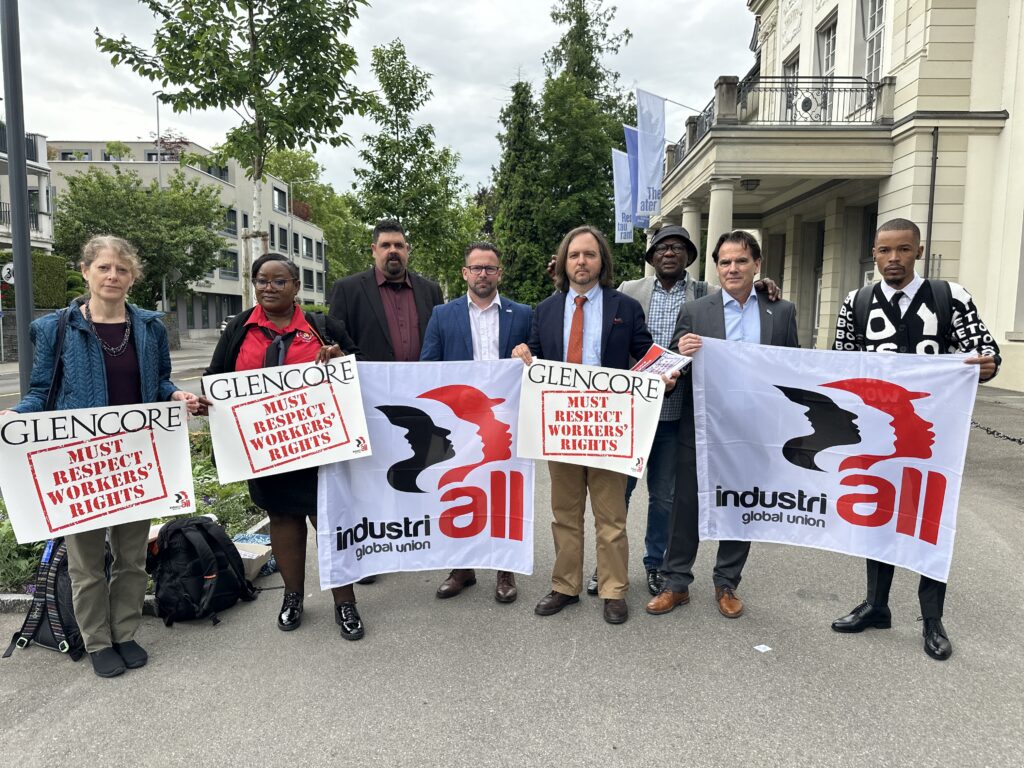3 June, 2025On 28 May a delegation comprising trade union representatives, NGOs, Indigenous leaders and affected community members from Colombia, Canada, South Africa and Switzerland convened at Glencore's annual general meeting (AGM) in Zug, Switzerland. Their unified demand: Glencore must address its persistent environmental, social and governance (ESG) shortcomings and engage in meaningful global social dialogue.
Delegates raised the company’s refusal to negotiate with workers on a fair and just transition and its ongoing aversion to sectoral dialogue that would ensure labour rights during the energy transition.
During the AGM, IndustriALL and its affiliates challenged Glencore’s board on a number of pressing issues.
Canada: delegates questioned why a clause on just transition and social dialogue was excluded from the collective bargaining agreement at the Horne smelter. They called on the company to engage directly with workers’ representatives and to commit to negotiated solutions that protect jobs and communities.
Colombia: Glencore has announced plans to close the Cerrejón mine in La Guajira by 2034 and recently confirmed significant production cuts. The lack of transparency around the closure process—especially in light of the company’s deeply criticized handling of the Prodeco shutdown—has intensified fear and uncertainty among workers and local communities. Many are still grappling with the fallout from that earlier closure. At the AGM, Glencore stated it had no official closure plan to share for Cerrejón.
“We call on the company to release its official mine closure document, to enable workers, the national government and affected communities to prepare and plan for a just transition. This request is not a call for early closure, but rather a call for preparation, coordination and fairness,”
says Juan Carlos Solano Guillen, transition secretary- Sintracarbon.
Sintracarbon also urged Glencore to support retraining and alternative employment programmes for former workers at La Jagua in the Prodeco area, which remains abandoned after the company withdrew operations.
Despite the escalating material risks associated with its operations, Glencore has declined to participate in the Initiative for Responsible Mining Assurance (IRMA), a globally recognized standard for responsible mining practices.
While Glencore’s CEO, Gary Nagle, insisted that health and safety remains the company’s top priority, delegates and community leaders rejected these claims. They argued that rhetoric must be matched by concrete action. From smelter closures to environmental damage, Glencore’s operations continue to harm workers and communities with little evidence of accountability or redress.
“We call on Glencore to engage in global social dialogue, commit to responsible mining standards and ensure that the shift to a low-carbon economy does not come at the expense of workers' rights and livelihoods. Until Glencore acts, the global campaign for justice, transparency and a just transition will continue to grow in strength and urgency,”
says Glen Mpufane, IndustriALL mining director.
In a Glencore network meeting, held a day before the AGM, union affiliates described a consistent pattern of misconduct. In Australia, Glencore is exceeding legal emissions thresholds and has dragged workers through the courts in an effort to block the “same work, same pay” campaign, instead of addressing pay inequality.
In South Africa, Glencore has closed smelters with little warning or planning, leaving workers unemployed and communities devastated.
“Are they able to sell the smelters to other businesses? Is this something that Glencore can look into,”
asks Donald Makofane, regional youth secretary of the National Union of Mineworkers (NUM).
In Canada, pollution from the Rouyn-Noranda smelter continues to threaten public health, emitting arsenic at levels thirty times above the provincial limit.
“We want to keep jobs, but not at the expense of our health,”
says Kevin Gagnon from Fédération de l'Industrie Manufacturière – FIM-CSN.
“Glencore cannot keep ignoring its responsibilities while communities suffer the consequences. We’ve campaigned for years and we’re not going anywhere. We will not be silenced.”
said Kemal Özkan, IndustriALL assistant general secretary.
